Grebel aims to be a space for conversation and connection among people of diverse backgrounds and academic disciplines. Because Grebel administers the University of Waterloo’s Music program, the College naturally attracts musically talented students from every faculty at Waterloo. Some Grebel alumni have gone on to have remarkable careers in music performance, composition, conducting, and teaching. Others have chosen to combine their love of music with other passions in complementary fields. The following profiles highlight a sampling of alumni who have merged their interests in music and another field. We asked: How are you combining music with another field or interest? How has this fusion enriched your life, taken your life in an unexpected direction, or led to an accomplishment you’re proud of? How did Grebel inspire this path?
TYLER REIDY (BA 2018)
Certified Music Therapist (MTA) at Grand River Hospital, Guelph ON
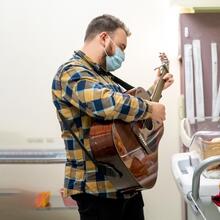 I’ve combined my interests in music and in psychology to consider the impact of music therapy for individual development, health, and wellbeing. I was most intrigued by the impact that music could have on children in a hospital setting and how music could be harnessed as an aid for developmentally-focused support. Music Therapy was the perfect blend of music and psychology for me, as I was able to utilize my passion and knowledge within the context of health care. When I found out about music therapy, I pursued graduate studies in music therapy and became a certified music therapist with the Canadian Association of Music Therapists (CAMT).
I’ve combined my interests in music and in psychology to consider the impact of music therapy for individual development, health, and wellbeing. I was most intrigued by the impact that music could have on children in a hospital setting and how music could be harnessed as an aid for developmentally-focused support. Music Therapy was the perfect blend of music and psychology for me, as I was able to utilize my passion and knowledge within the context of health care. When I found out about music therapy, I pursued graduate studies in music therapy and became a certified music therapist with the Canadian Association of Music Therapists (CAMT).
When I consider my original goals of becoming an elementary school music teacher 10 years ago, I would never have considered music therapy as an option because I did not know it existed. I am now a full-time music therapist, primarily working within the children’s program. I provide support to patients in the Inpatient Children’s Unit, Outpatient Pediatric Oncology Clinic, Neonatal Intensive Care Unit (NICU), and the Intensive Care Unit (ICU). My work context often uses music for the developmental needs for premature infants/babies in the NICU, for supporting children and families during scary procedures in the hospital, and being able to facilitate meaningful interactions with music reminiscing with seniors and their loved ones. I can’t think of a more special place than being able to create meaningful musical experiences with individuals who are in very vulnerable and frightening times of their lives, and being able to make those times more tolerable, normalized, and safe.
Grebel was my launching pad into this intersectional interest. I studied flute and had a keen interest in learning more about music in various contexts. The courses that I found most impactful were Maisie Sum’s Music, Health, and Healing, and Laura Gray’s Music and Aesthetics, and Music and Landscape. These courses gave me the knowledge and freedom to explore my interests of music therapy with ongoing support, which led me to completing my undergraduate thesis in intersections between music education and music therapy with Professor Gray. As a student, I felt inspired, welcomed, and motivated, and I can honestly say that I would not be where I am today without the encouragement of members of the faculty.
NICOLE SIMONE (BASC 2016)
Senior Software Developer, Shopify, Kitchener ON
I have always been passionate about music, but I also love math, science, and technology. Day-to-day I work as a software developer, while also remaining very active in the local music community as a pianist, including with the University Choir at Grebel and with various theatre companies. I love being able to continue exploring multiple areas I’m passionate about.
 Combining music with my engineering studies while at Waterloo led to many amazing opportunities. I was able to combine both areas in my fourthyear engineering project, where my group used image processing to detect the movements of a conductor’s baton, and we brought the project in to test in the conducting class I was taking at the time at Grebel. While on a co-op term in New York working as a software developer intern, I was also able to take several classes at Juilliard toward my music major. I even met my husband in the engineering jazz band while at school!
Combining music with my engineering studies while at Waterloo led to many amazing opportunities. I was able to combine both areas in my fourthyear engineering project, where my group used image processing to detect the movements of a conductor’s baton, and we brought the project in to test in the conducting class I was taking at the time at Grebel. While on a co-op term in New York working as a software developer intern, I was also able to take several classes at Juilliard toward my music major. I even met my husband in the engineering jazz band while at school!
Seeing so many students in my music classes while at Grebel who had other majors outside of music helped inspire me to know that it’s possible to continue pursuing multiple fields, and that you don’t need to choose just one.
JESSE MATAS (MPACS 2022)
Musician, Treaty 1: Winnipeg MB
In songwriting, combining music with other fields is part of the job description. When I think about songs I’ve heard that have really moved me, they always seem to reach deep into other aspects of life. Whether they’re from personal experience, a family history, a response to a social situation or an expression of a feeling, they’re always drawn from another field of interest. I always try to keep this in mind when writing. One of the beautiful parts of writing songs is that I never know what a song is going to be about until it comes.
 When it comes, it often requires researching a new field. Recently, I’ve been writing a lot about human to non-human relationships, something I also explored in formal research and essays during my MPACS degree. In a way, songs are the canvas I have to paint the world. What I choose or am called to paint requires research in other fields of study. Then I must communicate this research through a combination of words and music.
When it comes, it often requires researching a new field. Recently, I’ve been writing a lot about human to non-human relationships, something I also explored in formal research and essays during my MPACS degree. In a way, songs are the canvas I have to paint the world. What I choose or am called to paint requires research in other fields of study. Then I must communicate this research through a combination of words and music.
Bringing these fields of study into my musical practice has certainly enriched my life in ways I never have imagined. I feel blessed to have toured around the world, playing to thousands of people. I have also loved conversing about the topics that I’ve written about, like live organ harvesting in China or Site C Dam. Music has given these topics a platform. I love the feeling of it all coming together.
I was extraordinarily grateful for Professors Jennifer Ball and Karen Sunabacka, the supervisors who worked with me to combine music with PACS during my graduate studies. I am also grateful to Professors Nathan Funk and Reina Neufeldt, the department chairs, who approved the research. All of my other professors and the student body have been incredibly supportive of this music and Peace and Conflict Studies combination. I have loved talking colleagues about the song I wrote during this time and how it connects PACS.
BRANDON LEIS (WLU 2004)
Teacher, Director, Conductor, Performer, Kitchener ON
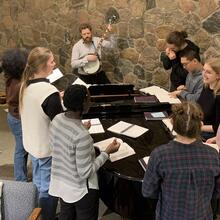 I’m combining music with my passion for teaching and focus on community. In 2015 I helped develop an undergraduate program in the emerging field of Community Music at Wilfrid Laurier University, where I have been teaching since 2009. I regularly teach courses, lead workshops, and generate scholarship in this field.
I’m combining music with my passion for teaching and focus on community. In 2015 I helped develop an undergraduate program in the emerging field of Community Music at Wilfrid Laurier University, where I have been teaching since 2009. I regularly teach courses, lead workshops, and generate scholarship in this field.
This fusion of music with community, through a postmodern approach to the arts, has redressed some of the imbalances that persist(ed) as the study and practice of music-making became professionalized and institutionalized over the last few hundred years. This new approach to music-making and its facilitation enables greater participation, inclusion and diversity. I thoroughly enjoy being a part of where and how Community Music manifests itself locally and around the world. I currently apply these practices as a teacher at WLU, as a church music director at Stirling Avenue Mennonite Church, as the Artistic Director of the Menno Singers, and, while currently covering a sabbatical leave, as the director of Grebel’s Chapel Choir.
One of the key tenets to Community Music, and its most appealing factor to me, is its ‘acts of hospitality through an open door’ mandate. This resonates strongly with Grebel’s intentionality toward community building through the practices of Community Supper, filling a table, open door policy, loud hours, and the rest of the non-formal activities and ethos allowing individuals to be known and to get to know others.
JANE RAMSEYER MILLER (BA 1984)
Artistic Director, GALA Choruses, Minneapolis MN
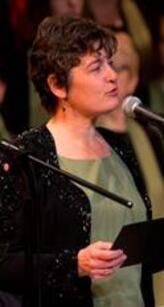 I recently transitioned out of conducting One Voice Mixed Chorus, a 125-voice LGBTQ choir in Minnesota after 27 years. I also work as artistic director for GALA Choruses, facilitating a network of around 200 LGBTQ choirs throughout North America. While my degree was in Psychology, I had more music credits than psych when I graduated. In working with conductors, I always say that I utilize both degrees every day. So much about conducting is about supporting and motivating people, about navigating emotions, about listening to the music but also listening to the experiences of singers in the ensemble.
I recently transitioned out of conducting One Voice Mixed Chorus, a 125-voice LGBTQ choir in Minnesota after 27 years. I also work as artistic director for GALA Choruses, facilitating a network of around 200 LGBTQ choirs throughout North America. While my degree was in Psychology, I had more music credits than psych when I graduated. In working with conductors, I always say that I utilize both degrees every day. So much about conducting is about supporting and motivating people, about navigating emotions, about listening to the music but also listening to the experiences of singers in the ensemble.
As a conductor, I spend significant rehearsal time facilitating conversations with singers about the music we are performing, the text and context of the composer, and how a composition touches issues in our own lives. One of my last concerts with One Voice, titled “Sound Mind,” explored the intersections of music and mental health and was profoundly moving as we were coming out of the pandemic.
During my 27 years with One Voice I commissioned more than 50 new choral works, mostly by BIPOC and LGBTQ composers. Giving voice to composers who are less visible in the published music world is a passion of mine.
During the pandemic I also produced a choral concert/film culminating after four years of collaboration with Ojibwe and Dakota artists in Minnesota. Remembering: Singing Water and Bayard Rustin: The Man Behind the Dream are two projects that have been huge career accomplishments. They can both be viewed at OneVoiceMN.org.
Interestingly, I moved to Minnesota with a household of Grebel friends. We chose St. Paul as a place to live together in community and work in local nonprofits. Grebel classes in PACS and living in community both offered skills that I use in facilitating group conversations and in my non-profit work. Grebel gave me a space to hone communication skills, community organizing, music making, and encouraged me to find ways to challenge and change the world around me.
BRIAN RUDY (BES 1989, BARCH 1993)
Architect and Partner, Moriyama Teshima Architects (MTA), Toronto ON
I have always been fascinated at the connections and similarities between the mediums and the making of architecture and music. Both, in their own way, require considerations of structure, rhythm, proportion, pacing, crescendo, and mood. To create both requires a mixture of intuition, logic, composition, and creative collaboration between experts. Through my career, I have tried to keep both pursuits active and even combining them at times when I have the opportunity, for example, to compose and record music for an architectural animation. My last full length “album” called Museum was inspired by having completed several museum projects, as well as the work we are doing at MTA to achieve a high level of sustainability on our projects. It is a musical examination of the themes of how society looks backward to preserve its history mixed with the forward-looking challenges of climate change.
 It’s easy to underestimate the ways in which music can enrich one’s life—it is such a visceral, emotive yet structurally precise medium. I strongly believe that my work as a musician deepens my skills as an architect in many ways, including confidence, presentation skills, compositional decision making, creative collaboration, and probably in many non-measurable ways as well. I think I’m a better architect because of music, and a better musician because of architecture.
It’s easy to underestimate the ways in which music can enrich one’s life—it is such a visceral, emotive yet structurally precise medium. I strongly believe that my work as a musician deepens my skills as an architect in many ways, including confidence, presentation skills, compositional decision making, creative collaboration, and probably in many non-measurable ways as well. I think I’m a better architect because of music, and a better musician because of architecture.
I’m a huge fan of Grebel, having met my wife (Judy Penner) there, and having both of our boys (Alex and Adrian Rudy) attend there as well. I even worked professionally at Grebel when our architectural firm designed the recent kitchen/dining expansion. I have deeply fond memories of playing music in the reverberant stairwells of the residence, playing talent shows, meeting and collaborating with musically talented friends—many of whom I still have to this day. Grebel provided the perfect community to support and enrich these very formative years of both my musical and architectural education.
HENRY WINTER (BA 1988)
Retired Teacher, Musician for Seniors, St. Agatha ON
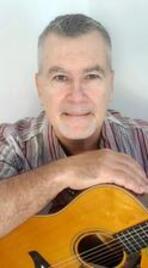 I spent 33 years in the history and social science secondary school classroom. Bringing relevance and understanding of stories from the past to students in the present was a very fulfilling career. My formal time with teenagers in the classroom has ended, but I now have the opportunity to facilitate connections with a different age group. I get to create space for seniors to relive some past memories and offer modern perspectives through music.
I spent 33 years in the history and social science secondary school classroom. Bringing relevance and understanding of stories from the past to students in the present was a very fulfilling career. My formal time with teenagers in the classroom has ended, but I now have the opportunity to facilitate connections with a different age group. I get to create space for seniors to relive some past memories and offer modern perspectives through music.
I get to see the incredible power of music every time that I perform. Music can act as a time capsule by unlocking memories from a forgotten period. I get to see how good music combined with a good story can allow for emotional connection—to self and others. Music inspires, motivates, provides perspective, challenges, calms and energizes—I get to see these realities play out in my new career. This new venture is more fulfilling than I ever dreamed possible!
Although I did not study music formally, Grebel allowed me to to develop and hone my musical interests. Making music with friends in the reverb-saturated stairwells, singing in Chapel Choir, being introduced to the various musical styles of my peers, and performing at student-run talent shows were all ways that Grebel encouraged my passion for music. Choosing a path at university can be difficult, but Grebel allowed me to pursue a formal study of the social sciences while supporting my non-academic development of music. For this I am very, very grateful! I guess you could say that my current hybrid music and storytelling career was sprouted back in the 1980s when Grebel was my hangout.
SARA FRETZ (BA 1998)
Music Therapist and Psychotherapist, Kitchener ON
In my career, I use music clinically in therapy to achieve nonmusical goals to promote physical, emotional, mental and spiritual wellbeing. Music is a unique and powerful tool for healing. I have also done additional training in Vocal Psychotherapy, which is defined as the use of the voice, improvisation, song, and dialogue within an analytic orientation to promote intrapsychic and interpersonal change. This method combines singing and the use of voice with depth psychology, Jungian analysis, and trauma theory.
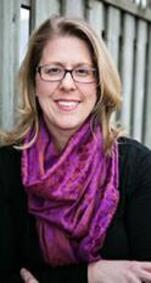 Music Therapy has transformed my life and led to many accomplishments I feel proud of, such as working with women in the Headingly Correctional Centre in Manitoba, where in collaboration with an Indigenous Elder, we used traditional drumming and singing to transform the lives of women in prison. I developed a music therapy program at Lutherwood in Waterloo for youth 12-18 who had fallen through the cracks as young offenders, I helped stigmatized children and adults find their voice at Corizon Family and Community Services in Kitchener, and at the Brant Community Healthcare System, and I worked with Indigenous women in Vancouver’s East Side to help them find empowerment and self-expression through vocal psychotherapy. Now I work with women and children to help find their voice as they take steps to end the cycle of violence and abuse. The power of music transcends words and allows for the opportunity to connect to our deepest sense of self and wisdom.
Music Therapy has transformed my life and led to many accomplishments I feel proud of, such as working with women in the Headingly Correctional Centre in Manitoba, where in collaboration with an Indigenous Elder, we used traditional drumming and singing to transform the lives of women in prison. I developed a music therapy program at Lutherwood in Waterloo for youth 12-18 who had fallen through the cracks as young offenders, I helped stigmatized children and adults find their voice at Corizon Family and Community Services in Kitchener, and at the Brant Community Healthcare System, and I worked with Indigenous women in Vancouver’s East Side to help them find empowerment and self-expression through vocal psychotherapy. Now I work with women and children to help find their voice as they take steps to end the cycle of violence and abuse. The power of music transcends words and allows for the opportunity to connect to our deepest sense of self and wisdom.
I went to a performing arts high school majoring in music. I was passionate about singing and music and also loved psychology, but did not know there was a way of combining these interests. When I chose to go to the University of Waterloo for Psychology instead of the University of Toronto for voice, it was because of Conrad Grebel College. I wanted to immerse myself in the Grebel experience and connect with my own history as a Mennonite. At Grebel I led Chapel Services as the Music Convenor and sang in Chapel Choir. I took Professor David Huron’s Psychology of Music course, and it changed my life. I learned that there was a place where music and psychology could meet in a field called Music Therapy. I was deeply inspired by how music could heal us physically, emotionally, mentally and spiritually. Len Enn’s Chapel Choir also influenced my journey, bringing to life my love of music as a prayerful and spiritual expression of my faith. My experience under Len also shaped my identity as a therapist. I have continued to be inspired by Len Enns through my continued participation in the DaCapo Chamber Choir.
SARA MARTIN (BA 1997)
High school librarian, Manager DaCapo Chamber Choir, Kitchener ON
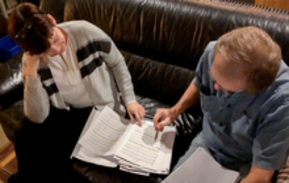 I am the Manager and a founding member of the DaCapo Chamber Choir, having sung with the choir in all of its 25 seasons. Grebel fostered this love of music and showed me how music can be a powerful tool for peace and social change. DaCapo rehearsals (in the Grebel Chapel!) are still a weekly highlight for me. Although my day job is a high school librarian, my Grebel undergrad—in particular, my experience singing with the Chapel Choir, under director Leonard Enns—has profoundly shaped my “side career.”
I am the Manager and a founding member of the DaCapo Chamber Choir, having sung with the choir in all of its 25 seasons. Grebel fostered this love of music and showed me how music can be a powerful tool for peace and social change. DaCapo rehearsals (in the Grebel Chapel!) are still a weekly highlight for me. Although my day job is a high school librarian, my Grebel undergrad—in particular, my experience singing with the Chapel Choir, under director Leonard Enns—has profoundly shaped my “side career.”
Having completed an undergrad in Arts, Applied Studies, Co-op and therefore no longer eligible to sing with the Chapel Choir anymore, I and a group of other graduates convinced Leonard Enns to form a new choir—the DaCapo Chamber Choir in 1998. A few years into the choir, my undergrad/co-op advertising and marketing experience led me to volunteer to help out with the logistics related to running the choir. Two decades later, I am still the logistical arm of the organization.
I am extremely proud of the work we’ve done with choir—bringing meaningful programming to our audiences, commissioning new works from emerging composers, performing at the Mennonite Arts Weekend in Cincinnati, Ohio, and so much more. Not only do I get the joy of performing, but I can use my organizational skills to collaborate with Len and help the organization that has enriched my life so profoundly.
One of the most rewarding experiences was the release our third CD recording, NewWorks—a compilation of 10 years of entries to our national NewWorks choral composition competition. Not only did I get to work with my amazing graphic designer sister, Heather Lee (also a Grebel grad!) on the packaging (which we also did for our two previous releases, Shadowland and Still), but I got to put my ears to the test and produce the CD along with director Leonard Enns and recording engineer Earl McCluskie. To have played a key part in sharing the incredible work of living Canadian composers, sung by our phenomenal choir, is an experience I will take with me long after I retire from arts administration.
NICK MALDONADO (BA 2013)
Sales Manager, Musician, Kitchener ON
Through networking at gigs, going to local shows, and even chatting with clients at work, I’ve been able to bridge the gap between the professional and personal spheres in a genuine way. It has led to paid gigs in town, session work recording guitar and backing vocals for a few local artists, recording albums with several bands at different times, and forging some great friendships too.
professional and personal spheres in a genuine way. It has led to paid gigs in town, session work recording guitar and backing vocals for a few local artists, recording albums with several bands at different times, and forging some great friendships too.
I’m very lucky to have been involved with the scene in the Waterloo region, meeting artists from different backgrounds. People light up when they discover a shared passion, and that is as true in our social lives as it is in business! Several years ago, our band performed on the big stage at Centre in the Square during the 25th annual Arts Awards Gala, and a couple of us became committee members afterward. I would put that experience up there with opening for I Mother Earth and recording at Noble Street Studios. Having music as a creative outlet gives me ways to channel the joys and stresses of life into something that, hopefully, everyone can appreciate.
Grebel has always been an inclusive space and a central hub for music at UWaterloo with high academic and community standards. Both the staff and residents help to inspire success in each other and keep those four-part harmonies alive. Whether working on a project or practicing, at Grebel I always knew that I could be myself with confidence. Being able to walk down the hall to the Chapel for Chamber Choir or Water Boys practice in such a rich-sounding space, and still play my guitar at talent shows was such a treat. I probably owe some fellow residents an apology though—I should have made better use of the practice rooms!
STEVE DRIEDIGER (BASC 1996)
Hardware Designer, Musician, Sound Technician, Ottawa ON
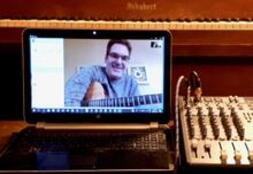 As an amateur church musician, I find it amazing to see how sacred music combines text with melody, harmony, rhythm, and dynamics to express what words alone can sometimes only say incompletely. Coming from a high-tech profession, I am equally amazed at how amplitudes and phases of competing frequencies (pure tones) combine to create not only the pitch and volume of those notes but also their timbre and even the words themselves. On Sundays when I’m not involved with singing or playing guitar from the front of our church (Ottawa Mennonite), I’m generally involved with the technical aspects of sound and streaming from the back. Sitting between those who are singing/playing and those who are in the congregation, the tech becomes an extension of the voices/instruments, with everything from mic placement to monitor levels, and from feedback to EQ affecting the worship experience of everyone involved.
As an amateur church musician, I find it amazing to see how sacred music combines text with melody, harmony, rhythm, and dynamics to express what words alone can sometimes only say incompletely. Coming from a high-tech profession, I am equally amazed at how amplitudes and phases of competing frequencies (pure tones) combine to create not only the pitch and volume of those notes but also their timbre and even the words themselves. On Sundays when I’m not involved with singing or playing guitar from the front of our church (Ottawa Mennonite), I’m generally involved with the technical aspects of sound and streaming from the back. Sitting between those who are singing/playing and those who are in the congregation, the tech becomes an extension of the voices/instruments, with everything from mic placement to monitor levels, and from feedback to EQ affecting the worship experience of everyone involved.
During the pandemic, life moved online, and the technical aspects required for worship changed. As singing together over Zoom simply does not work, I began producing virtual recordings for worship services. It started small, by collaborating with a good friend to record some guitar duets and grew to larger virtual ensembles. Together with my daughter, Rachael, we also worked with our church choir to produce choral recordings with about 30 voices to celebrate Thanksgiving, Christmas, and Easter. It was very meaningful to hear our voices raised “together” in praise once again, at a time when even being in the same room was considered dangerous.
My musical contributions are at the intersection of faith, community, and technology, and I can see how my time at Grebel nurtured all three of those aspects. David Huron’s course Computer Applications in Music provided interesting food for thought on how technology can contribute to our musical world. Singing together in Chapel and hearing the Chapel Choirs of Len Enns and Ken Hull were truly inspiring, but jamming with friends in our rooms, the resonant stairwell, or around the retreat campfire made me realize how well music can connect us and foster community. Similarly, technical “jamming” with Grebelite friends and classmates inspired me in other ways, letting me see tech design as a creative outlet, not entirely unlike musical outlets.
LAURA ENNS (BES 2013)
Community Musician and Live-In Host of Brubacher House, Waterloo ON
As a community musician, I am interested in facilitating participatory musical experiences for social impact in diverse community contexts. I am always looking for ways to bring together my love of music with my interest in social and environmental justice.
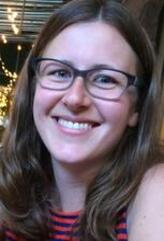 It inspired me to pursue my dream of studying at the Irish World Academy of Music and Dance at the University of Limerick, where I completed an MA Community Music in 2016 and had the opportunity to lead music workshops for asylum seekers living in Limerick. I also enjoyed spending the following year travelling and visiting Christian Intentional Communities in Europe and the UK, such as Taize, the Iona Community, and Corrymeela, where I learned a lot and honed my skills in leading music and worship in church settings. Unexpectedly, Photo: Janice Lichti 13 this led me back to Waterloo, where I served as Coordinator of Worship and Community Engagement at Waterloo-Kitchener United Mennonite Church. I have also had the opportunity to explore my broader interests in arts, culture, and museum leadership as Live-In Host of Brubacher House at UWaterloo, where I now live and work with my husband Joshua and our two children.
It inspired me to pursue my dream of studying at the Irish World Academy of Music and Dance at the University of Limerick, where I completed an MA Community Music in 2016 and had the opportunity to lead music workshops for asylum seekers living in Limerick. I also enjoyed spending the following year travelling and visiting Christian Intentional Communities in Europe and the UK, such as Taize, the Iona Community, and Corrymeela, where I learned a lot and honed my skills in leading music and worship in church settings. Unexpectedly, Photo: Janice Lichti 13 this led me back to Waterloo, where I served as Coordinator of Worship and Community Engagement at Waterloo-Kitchener United Mennonite Church. I have also had the opportunity to explore my broader interests in arts, culture, and museum leadership as Live-In Host of Brubacher House at UWaterloo, where I now live and work with my husband Joshua and our two children.
I have so many wonderful memories of music-making at Grebel. Although I never took a music course, I spent time singing and leading music in Chapel, and jamming with friends there as we rehearsed trad songs and indie covers for coffee houses and Taste of Grebel. This led to creating original folk music and releasing two studio albums with fellow Grebelite Dan Root as Quiet in the Land. Since getting involved in church and community music more professionally, many of my work opportunities have come through Grebel connections. The rich culture of music, faith, peacebuilding, and Mennonite heritage at Grebel continues to inspire me as I find expression for these aspects of my life journey through my work and parenting.
CHARLES DICK (BA 1979)
Owner, Courier Printing Co. of Allen County (retired), currently Charles Dick Luthiery, Spencerville IN
 While in university, my cousin Evan Miller and I got a book by David Russel Young on building a steel string guitar. After visiting Jean Larrivee’s shop in Toronto, we built a guitar in the basement of his house. After moving to Edmonton, Alberta I worked for a short time with a well-known luthier, Frank Gay, building and repairing guitars. I’ve continued to build mainly guitars, but also mandolins and an occasional banjo, ukulele, and violin.
While in university, my cousin Evan Miller and I got a book by David Russel Young on building a steel string guitar. After visiting Jean Larrivee’s shop in Toronto, we built a guitar in the basement of his house. After moving to Edmonton, Alberta I worked for a short time with a well-known luthier, Frank Gay, building and repairing guitars. I’ve continued to build mainly guitars, but also mandolins and an occasional banjo, ukulele, and violin.
As a hobby, guitar making provided me with a connection to the music I loved. Especially rewarding was building a couple of mandolins for my Grebel roommate, Dave Neufeld. I also built a classical guitar for Nathan Gundy, another Grebel alumnus.
The excellent musicians and friends and acquaintances I played guitar with at Grebel helped inspire the direction my hobby took and continues to take. Also, Helen Martens’ excellent music courses were a great addition to my education.
TIMOTHY BERGEN (BA 1976)
Violin Maker/Restorer at George Heinl & Co. Toronto, Kitchener ON
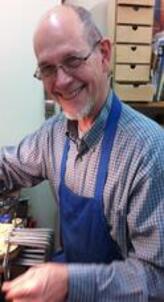 Music has always been very central for me from an early age, beginning with singing in church children’s choirs, playing violin from a young age to the present day in many different styles, and singing and playing mandolin and guitar in various ensembles. Yet, I couldn’t visualize music as a career, and switching academic tracks, became intensely interested in biblical and religious studies first at Canadian Mennonite Bible School (now CMU), and then at Conrad Grebel College (now CGUC). Upon graduation with a Religious Studies BA, and again not able to visualize a career in this field of interest, I discovered what did become my career back in the music world—violin making/repair/ restoration, and completed a three-year diploma at the Newark School of Violin Making in Newark, England. Working as a luthier has combined elements of my personal interests and strengths in a most satisfying way: a musical ear, a fascination with what makes people tick, a kinesthetic satisfaction of using my hands, eyes, and ears in creating this specialized type of fine musical instrument woodwork.
Music has always been very central for me from an early age, beginning with singing in church children’s choirs, playing violin from a young age to the present day in many different styles, and singing and playing mandolin and guitar in various ensembles. Yet, I couldn’t visualize music as a career, and switching academic tracks, became intensely interested in biblical and religious studies first at Canadian Mennonite Bible School (now CMU), and then at Conrad Grebel College (now CGUC). Upon graduation with a Religious Studies BA, and again not able to visualize a career in this field of interest, I discovered what did become my career back in the music world—violin making/repair/ restoration, and completed a three-year diploma at the Newark School of Violin Making in Newark, England. Working as a luthier has combined elements of my personal interests and strengths in a most satisfying way: a musical ear, a fascination with what makes people tick, a kinesthetic satisfaction of using my hands, eyes, and ears in creating this specialized type of fine musical instrument woodwork.
My career itself was quite an unexpected direction, and my life has certainly been enriched by the multifaceted fusion which is my work. I have enjoyed the challenge of solving the technical/ structural/sound problems that violins, violas, and cellos have presented. I’ve enjoyed the relationships and trust with musicians that has developed over many years. I’ve enjoyed the collegial atmosphere in the George Heinl violin shop in Toronto, where I’ve worked for more than 40 years. I’ve completed a number of longterm restorations of old Italian instruments from the 17th, 18th, and 19th centuries that were challenging, including some with famous names such as Stradivari, Guarneri, Guadagnini, and Rugeri. But I must say that helping a young student achieve the best sound and playability possible on their own humble instrument, and seeing their eyes light up with the improvements made, is always as satisfying as anything I do.
When I attended Grebel, I was in the intellectual mode of enjoying the academic exploration of many interests and questions that felt really important. I loved studying the basis for biblical faith and theological knowledge, the psychological understanding of human development and relationships, and the history of my Anabaptist background and of social justice. I loved being able to pick and pursue my own path, learning broader perspectives from my profs and their courses. I valued my classic liberal arts education at Grebel! I think it left me in a position of being open to what caught my attention, of noting, valuing, and accepting my own strengths and weaknesses. It allowed me to “follow my bliss”, even when it meant leaving my past bliss—the academic world—behind in the end. What I learned at Grebel, not least of which was a sense of confidence and openness to what is new, has always been part of me and informed me in every facet of my life and career.
NIAMH BROWN (BA 2016, MTS 2023)
Spiritual Care Coordinator, Fairview Seniors Community, Cambridge ON
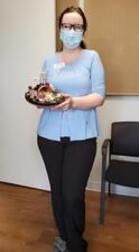 Music is a vital part of my ministry work at Fairview Seniors Community, where I have been the Spiritual Care Coordinator for four years. Throughout my work at Fairview, and especially during the pandemic, music has been a source of connection, reflection, meaningmaking, comfort, and wellness (emotionally, mentally, spiritually and relationally) for the residents. During worship services, hymn sing programs, small group conversations, and one-to-one visits, I incorporate music that is relevant to their needs. I especially integrate music as a source of spiritual support, wellness, and comfort, most importantly in palliative care.
Music is a vital part of my ministry work at Fairview Seniors Community, where I have been the Spiritual Care Coordinator for four years. Throughout my work at Fairview, and especially during the pandemic, music has been a source of connection, reflection, meaningmaking, comfort, and wellness (emotionally, mentally, spiritually and relationally) for the residents. During worship services, hymn sing programs, small group conversations, and one-to-one visits, I incorporate music that is relevant to their needs. I especially integrate music as a source of spiritual support, wellness, and comfort, most importantly in palliative care.
Integrating music into my vocation of spiritual care enhances the care and support that I can offer to residents and their families. Music brings reassurance in times of change or difficulty, or levity and connectedness in times of celebration. Music has also been a source of great fun and enjoyment at Fairview, both throughout our 80-year history, and especially in these past three years of the pandemic, when we’ve found joy through a virtual choir, outdoor hymn sing programs, a music-filled Christmas pageant, a music-centred mindfulness reflection program, and many more musical events and activities. Using my background in music to serve the community where I work is a source of deep meaning, joy, and satisfaction for me personally. It is also meaningful when we can welcome volunteers with musical gifts to share with our residents!
As an undergraduate student and resident at Grebel, I was fortunate to participate in many Music Department courses and ensembles, and also courses and placements through the Church Music and Worship specialization. A Ministry Inquiry Program placement at Parkwood Mennonite Home, facilitated by Grebel, provided me with initial experience with chaplaincy that has grown into a meaningful career and vocation. The skills, background and interest I developed in music at Grebel have been an important foundation for my use of music on a daily basis in my chaplaincy work. My undergraduate studies in Music have provided a meaningful foundation for my graduate studies in Grebel’s MTS program.






